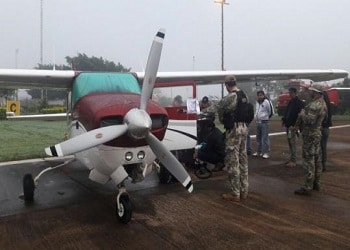Ecuador launched an operation in early April to seize an illegal landing strip, thought to be linked to planes carrying drug shipments, but such isolated responses are unlikely to stem the flow of narco flights.
Ecuador’s police launched Operation Aeronave on April 1, when a plane was seen making an unauthorized landing on a piece of land belonging to an oil refinery in the province of Manabí. The plane, thought to be carrying a shipment of drugs, managed to take off again while nine men who were standing guard opened fire on the police.
The alleged drug traffickers involved were arrested, with two of them later confirmed as active police officers. While the plane escaped, the police seized around $200,000, four firearms and a number of vehicles.
General Marco Villegas, the head of Ecuador’s anti-narcotics strategy, told Democracia TV that drug trafficking groups prioritize areas such as the refinery for narco flights as there are both paved roads for easy access and ample vegetation to mask the landings.
Narco flights are hardly new in Ecuador. In March, an aircraft carrying over 35 kilos of cocaine chlorhydrate crashed in Montecristi.
SEE ALSO: Ecuador News and Profile
Between 2003 and 2019, Ecuadorean authorities have seized or downed 19 planes carrying drugs, seizing over 900 kilos of drugs. However, with an estimated 2,500 private landing strips across the country, these may have been a mere a drop in the ocean.
InSight Crime Analysis
Despite the efforts made to tackle the issue, aerial drug trafficking remains an Achilles heel for Ecuador and many Latin American countries.
Operation Conquistador in January showed that joint military operations and intelligence sharing may find some success, after a transnational criminal organization who sent drugs by plane from Ecuador to Mexico was dismantled by authorities from both countries.
After the murder of three staff from the El Comercio newspaper along the Ecuador-Colombia border in 2018, the two countries increased security cooperation, especially along the Pacific Coast and the border between Nariño and Esmeraldas.
However, flights continue to offer a convenient way for drug traffickers to circumvent any effective supervision. And with a reported 2,500 private landing strips across Ecuador, meaningful strategies to prevent them may be hard to come by.
SEE ALSO: New Book Highlights Flaws in Ecuador-Colombia Border Security Strategy
A lack of appropriate technology and training has been a consistent problem. This year, Paraguay lost track of a narco flight and admitted it had neither the capacity to track or shoot down such planes.
Ecuador has invested in technologies capable of intercepting some illegal flights. In 2009, it bought Chinese radars that were later replaced in 2016 by the ones produced by a Spanish company. However, the escape of the plane during Operation Aeronave highlighted the persistent inadequacy of Ecuadorean security measures and technologies.

